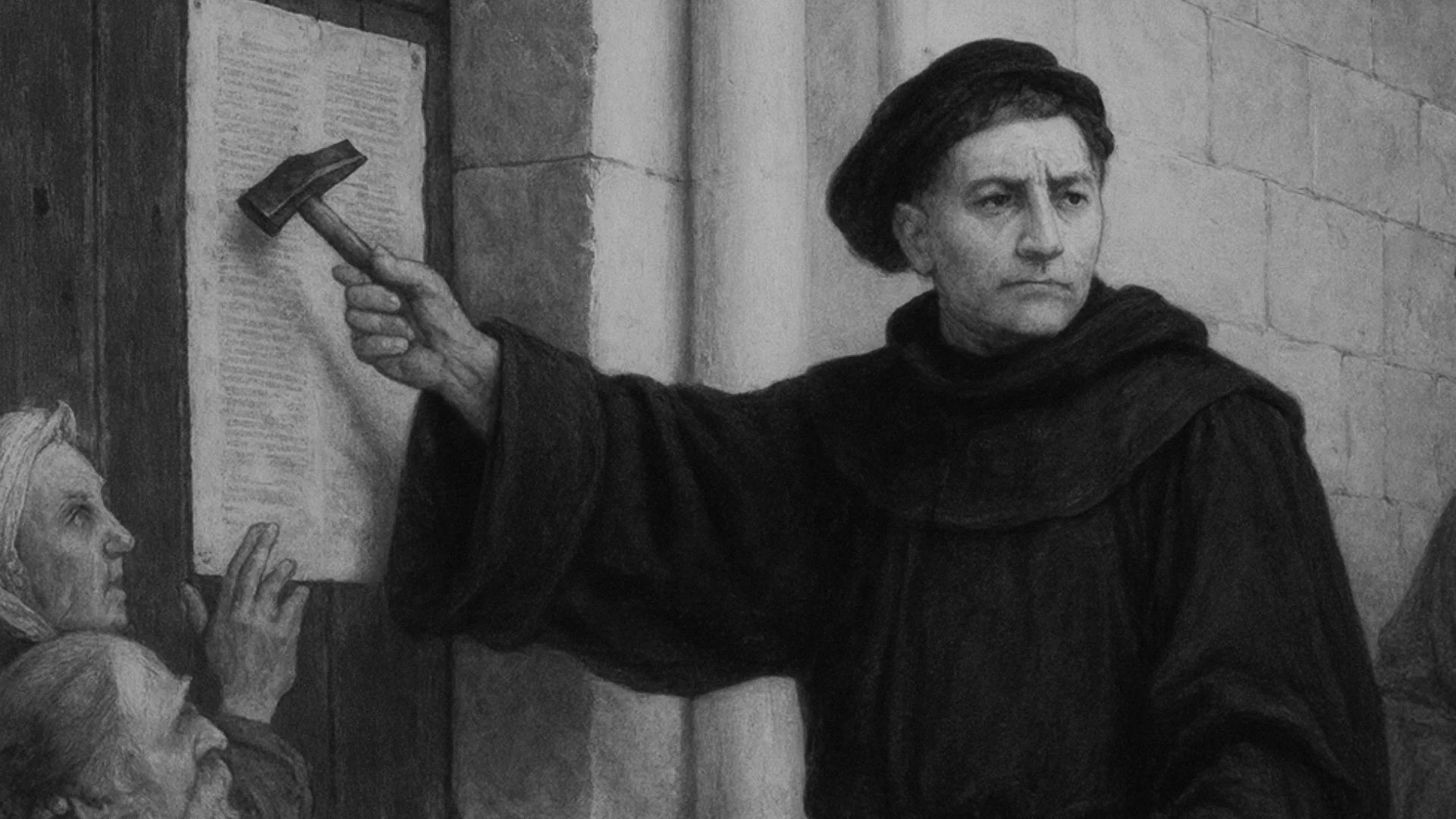Access for All: Why Reformation Day Still Matters
Martin Luther affixes his Ninety-Five Theses to the doors of Wittenberg Chapel on October 31, 1517—an act that ignited the Protestant Reformation and restored the Word of God to the people.
A DOOR, A HAMMER, AND A REVOLUTION OF ACCESS
On October 31, 1517, a young monk named Martin Luther approached the doors of the Wittenberg Chapel with parchment and purpose. In his hand were ninety-five convictions — not against the Bible, but against anything that kept people from it. When his hammer struck those wooden doors, the sound reverberated far beyond Germany. It was the sound of access — of a people once dependent on priests and Latin sermons being invited to read, question, and believe the Word of God for themselves.
When his hammer struck those wooden doors, the sound reverberated far beyond Germany. It was the sound of access.
Before that day, few could touch or even read Scripture in their own language. The Bible was chained — sometimes literally — to cathedral walls. The common Christian’s faith was filtered through clerical interpretation, inaccessible and distant. The Reformation shattered that barrier. It was more than a theological shift, it was a restoration of something sacred: the believer’s direct access to God’s Word.
THE REFORMATION WAS ABOUT ACCESS — NOT REBELLION
It’s easy to caricature the Reformation as a revolt. But at its core, it was a recovery. Luther, Calvin, Tyndale, and others weren’t trying to tear down the Church — they were trying to rebuild her on the foundation of Scripture. Their cry, Sola Scriptura (“Scripture alone”), wasn’t a rejection of tradition; it was a return to the authority that transcends all traditions.
Their cry, Sola Scriptura, wasn’t a rejection of tradition; it was a return to the authority that transcends all traditions.
When Luther translated the Bible into German, he gave his people more than words — he gave them ownership of their faith. When Tyndale said he’d make sure even “a plowboy” knew more of Scripture than a priest, he declared war on spiritual elitism. These were more than acts of reform — they were acts of love, grounded in the conviction that God’s Word belongs to His people.
THE LEGACY OF ACCESS
Five centuries later, the echoes of that hammer still shape us. Most of us can open a Bible in our own language. We can read it on paper or screen, in dozens of translations. Yet familiarity can dull reverence. What was once a miracle has become mundane.
Reformation Day calls us to remember that access to Scripture came at a cost — of exile, imprisonment, even blood. Men and women risked their lives to ensure we could hold God’s Word in our hands. Every bound volume, every printed verse, every translation is the fruit of their faithfulness.
What was once a miracle has become mundane
At Scriptura, we carry that conviction forward — that the Word of God deserves to endure. Every restored Bible, every preserved page, every act of careful craftsmanship is a small echo of that larger work: ensuring that Scripture remains not only readable, but revered.
The Reformation Continues
Though Luther’s hammer fell five centuries ago, the Reformation is not confined to history. The work of access continues — in translators laboring to bring the Bible into new languages, in teachers and pastors faithfully expounding its truth, and in ordinary believers opening its pages in quiet devotion.
There are still hearts waiting to hear the Word in their own language. Still nations where Scripture has yet to speak in the native tongue. Still souls in need of the same grace that drove the Reformers to action. The Reformation was not just an event — it was the beginning of a movement that continues every time the Word is opened and believed.
The Reformation was not just an event—it was the beginning of a movement that continues every time the Word is opened and believed
Why It Still Matters
Reformation Day matters because it reminds us who we are and what we’ve been given.
It reminds us that the Bible is not a museum piece, but a living revelation.
It reminds us that access to Scripture is both a gift and a responsibility — one we are called to guard, preserve, and pass on.
As the world celebrates other traditions on this same day, we pause to give thanks for a greater one: the day the light of Scripture broke through the walls of inaccessibility and shone once again in the hearts of God’s people.
Because of that October day, the Word was unbound.
Because of that grace, we now hold what they once longed to see.
HAPPY REFORMATION DAY!

